This is the second film directed by Cecil B. DeMille that I’ve watched, and I’m even more impressed this time around. More so than even D.W. Griffith, DeMille demonstrated an almost immediate intuitive grasp of the potential of film. When I first began compiling the list of films I’m working through I saw that DeMille’s second directorial effort was the first film version of Brewster’s Millions, and I was keen to see it. Unfortunately, that film has been lost, so I will only ever be able to wonder how Edward Abeles fared in the role of Montgomery Brewster. I’m going to assume his portrayal isn’t on par with that of either Dennis O'Keefe or Richard Pryor’s, and leave it at that, though if The Golden Chance, DeMille’s follow-up to The Cheat, which I discussed recently, is any indication, I may well be wrong.
The Golden Chance was one of 14 films DeMille directed in 1915. As it hit theaters on December 30th, you might think it was the last one he made that year, but nope— once The Golden Chance was in the can he went to work on Temptation, which was also released on the 30th. I know I bring this up a lot, but I don’t know how some of these directors did it. These are not simple, short films, yet DeMille managed to get a masterpiece like The Cheat into theaters on December 13th, and still have it in him to knock out two more before the year was done. I can’t speak to the quality of Temptation— it’s a lost film— but one assumes it was excellent based on the other two films DeMille made leading up to it.
Cecil’s brother William was also a director, and he wrote about his brother’s ability to direct two pictures simultaneously in his book Hollywood Saga. “C. B. with his usual audacity determined to direct both pictures at once, with two entirely separate production units. This he did by shooting The Cheat by day and The Golden Chance by night, a feat unique in motion-picture history. He finished both pictures on time and both were outstanding hits of that year.”
One wonders when he found time to direct Temptation.
The Golden Chance stars Cleo Ridgely as Mary Denby, the daughter of a judge who married below her station to disastrous results. She’s trapped in a tenement with a husband who splits his time between committing crimes and drinking away all the money he makes from them. Desperate for money to feed the two of them, Mary responds to a help wanted ad and is hired as a seamstress for the wealthy Hillary family. Mrs. Hillary immediately recognizes Mary as a woman of good upbringing, and is shocked when Mary tells her where she lives. Nonetheless, she puts her to work mending her clothes. It’s all for naught, as when she returns home that night, Steve, her no-good husband, takes the money she earns and goes out drinking.
Meanwhile, the Hillary family has a problem. Mr. Hillary is trying to convince the dashing Roger Manning, a young millionaire played by budding star Wallace Reid, who I last saw in a small part in The Birth of a Nation, to go 50/50 on a million-dollar investment. Manning is interested, but can’t invest because he is leaving town the next morning. When Mr. Hillary complains about the situation to his wife, she comes up with an idea, and asks Roger, eligible bachelor that he is, if he’d like to stay for dinner and meet “the most beautiful girl in the world.” Of course he would, but the plan seems foiled when the beautiful girl has to cancel. What to do? A scheme is hatched, and she dresses Mary up in her own clothing and jewels, and passes her off as an unmarried woman. Roger is very interested, and the two spend the evening chatting.
The plan seems to have failed when Roger says he’s still planning to leave come the morning. In a last-ditch Hail Mary, the cunning Mrs. Hillary tells him “too bad, Mary is spending the weekend here and we thought you might, too…” And our millionaire is hooked. But Mary has to explain to Steve, whom she tells she has to go do a three-day long laundry project in Newark. He buys it, and off she goes.
Back at the mansion, the plan works. Manning decides to stick around so he can spend more time with Mary, and invest with Mr. Hillary while he’s at it. Manning even proposes to Mary, who of course says no, though without explanation. While he broods by the fire, in a gorgeous shot— the light of the flame casting flickering shadows on Reid’s face as the smoke from his cigarette swirls about him— Mary goes upstairs and despairs. She’s in love with him, but knows she can’t pursue a relationship because of her marriage.
Meanwhile, in a coincidence one only finds in the silent era, Steve’s partner-in-crime Jimmy the Rat says word around town is there’s a girl wearing expensive jewelry at the Hillary mansion, and they plan to rob the house that night. He climbs in the window and starts pilfering jewels, only to find his wife sleeping in the room! Mortified by the entire situation, she doesn’t stop him, and he heads downstairs with his loot, only to encounter Manning, who calmly confronts him, and easily disarms him when Steve pulls a gun. The struggle awakens the household, and a tense scene ensues where Steve reveals to Manning that Mary is his wife, which she initially denies, though she later tells him the truth. Before this, the family lets Steve stage an escape, worrying that if the police come, Manning will learn of the truth and change his mind about investing with them.
Once Steve is gone, Mary comes clean to Roger. He’s appalled, and a crestfallen Mary changed back into her rags and wanders out into the night. She ends up sleeping on a park bench next to a bum. While this is happening, good old Jimmy the Rat has a new plan for Steve. They’re going to lure Roger Manning to pay a visit to Mary at home, then blackmail him for having visited a married woman. Ah, the old days, when moral turpitude was still a thing! Of course, the plan fails. They have Mary send a note to Manning, but she sneaks “don’t come” onto the back of it, so he shows up prepared. He tells his friend to send for the police if he isn’t out in five minutes. Once inside, after a tense scene made up almost entirely of a a series of rapid-fire close-ups, a very well-choreographed, and filmed, fight breaks out. It’s almost like watching a professional wrestling bout at times, and very effective, and a huge change of pace from the film up to this point. At the end, Manning is more or less winning, though he’s conked on the head just as the police show up, so who’s to say how the fight would have turned out. Steve tries to escape through the window, but is shot by the police and falls to his death. The film ends with a bloodied, but victorious, Manning comforting Mary, in whom he still seems to be interested, but she turns her gaze away, as if unsure what to do. I’d like to think the end up together, but we never know for sure.
Some thoughts on the actors:
Wallace Reid is spectacular. He would soon become one of the biggest stars of the late teens / early twenties, and his appeal is evident here. When he encounters Horace B. Carpenter coming downstairs after the robbery, he is coolness personified. Steve McQueen couldn’t have played that scene any better. Reid died in 1923 from a morphine addiction, a tragic loss of his life, and a devastating blow to cinema.
Cleo Ridgely is good for the role. She isn’t a stunning beauty, but has a cuteness to her that makes her believable as a girl who grew up in wealthy, but has been beaten down by a life of poverty after marrying Steve. Her acting is a bit one-note. She spends a lot of time giving a blank stare into the camera, but somehow, it works.
On one hand, Horace B. Carpenter’s Steve is a little bit too evil. We never get to see a side of him that could have wooed a judge’s daughter away from her life of luxury and into the slums. This may have been intentional, as DeMille needed to give audiences a firm reason to tolerate Mary’s quasi-infidelity, and eventual pairing off with Manning.
Ernest Joy and Edythe Chapman as Mr. and Mrs. Hillary are quite good. They give a good balance of kindness and opportunism to their performances. They aren’t exactly evil, but neither are they nice.
I found this review, from W. Stephen Bush in The Moving Picture World, January 8, 1916: “Never before have the lighting effects been used to such marvelous advantage. The highly critical spectators who saw the first display of the film were betrayed into loud approval by the many and novel effects. If paintings in a Rembrandt gallery or a set of Titians and Tintorettos were mysteriously transferred to the moving picture screen, the effect could not have been more startling.”
A review from January 29, 1916, published in The New York Dramatic Mirror, sings similar praises: “The master hand of Cecil B. DeMille is evident throughout the whole picture. His is the bigness of vision that can see and appreciate the value and importance of little things, and it is the attention to seemingly inconsequential details that makes The Golden Chance a big, gripping, human picture.”
The Golden Chance is available on a DVD, paired with another DeMille film, Don't Change Your Husband, which I’ll watch later in the project. It’s also available on YouTube, and I’ve linked it below.
Next I’m watching Civilization [1915], directed by Reginald Barker, Thomas H. Ince and Raymond B. West.

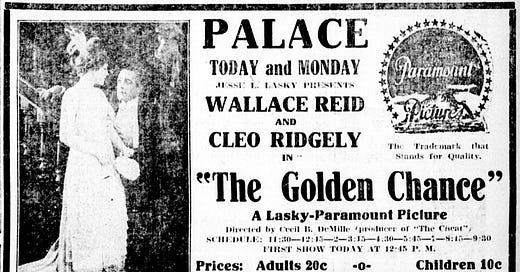



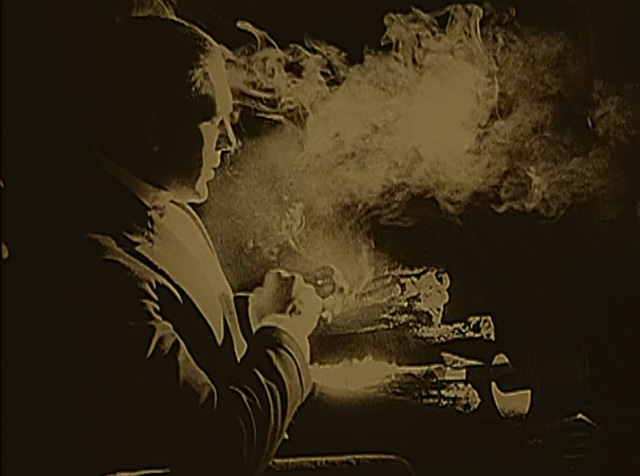
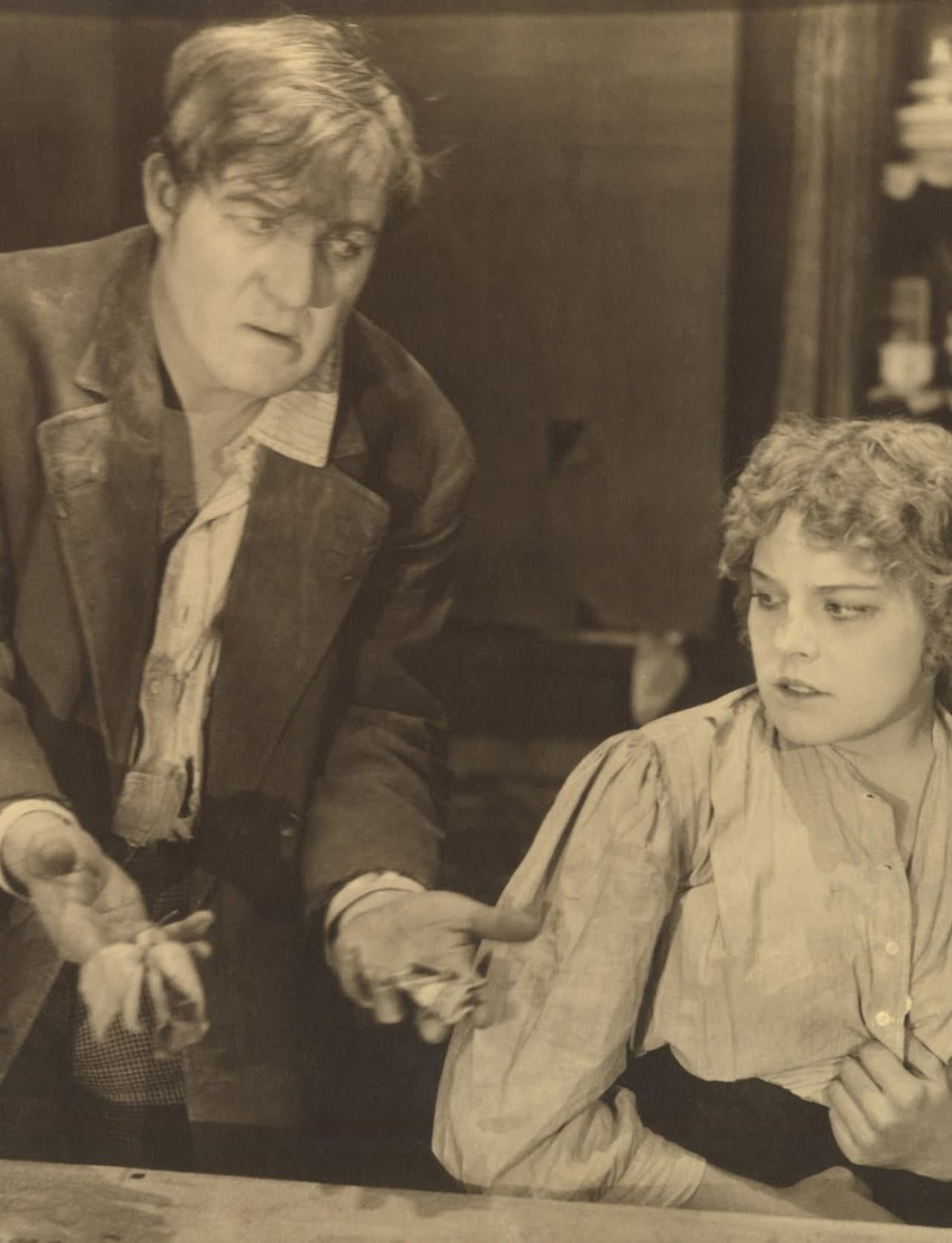
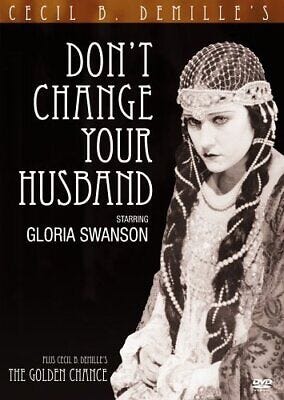

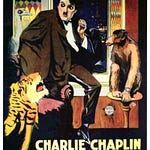
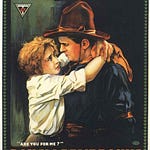
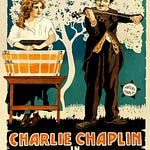

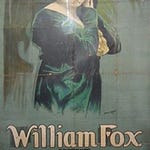
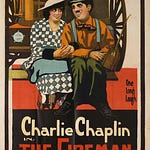

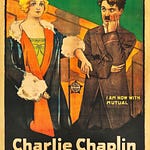
Share this post